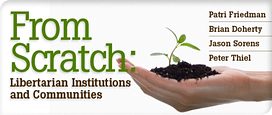Lead Essay
In this month’s lead essay, Patri Friedman charges libertarian activists with falling victim to bias: Specifically, they seem to suffer from the belief that advocacy and education are enough to change public policy. Friedman suggests otherwise, and he recommends that much more effort be put into demonstration projects that will show how a libertarian world might work. Not only will these projects do more than mere persuasion toward winning the war of ideas, but they will also allow individual libertarians to live in a much freer society, and they will exert competitive pressure on existing governments to reform themselves. Friedman discusses several such projects, including his own, the Seasteading Institute.
Response Essays
Brian Doherty argues that Patri Friedman is both right in some ways and wrong in others. He’s right when he argues that incentives and technologies largely determine the shape of government today, and create the problems that libertarians tirelessly point out. He’s wrong, however, to dismiss “folk activism” entirely: Not only has it achieved some clear though incremental good, but it also helps create more libertarians, and at some point, this effort seems likely to bear fruit. Not only that, but seasteading relies on some folk activism itself, in convincing a large number of people that it would be a good idea to try. On the whole, Doherty welcomes seasteading as one of many possible paths to a more libertarian world.
Jason Sorens reviews several important historical developments, including the rise of free trade in the nineteenth century and the growth of the welfare state in the twentieth. He concludes that structural change matters, and that incentives play a larger role than ideology in determining the type of government we get. He then considers several of the key challenges of both Seasteading and the Free State Project, as well as a few encouraging developments in recent politics that appear tied to the rise of the Free State movement. He counsels patience, but also proposes several strategies for moving forward.
Peter Thiel shares the belief that politics is mostly futile, a conclusion he reached after years of activism. In particular, he believes that democratic politics is unlikely to bring about libertarian outcomes. Fortunately, politics is just one sphere of human life, and it’s possible, he argues, to create technologies that minimize its reach. Thiel describes a “deadly race” between politics and technology, in which human freedom is the prize. The goal of libertarian activism should not be to win in politics, he argues, but to escape it.

